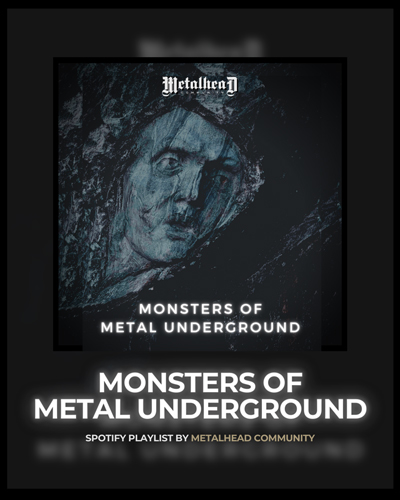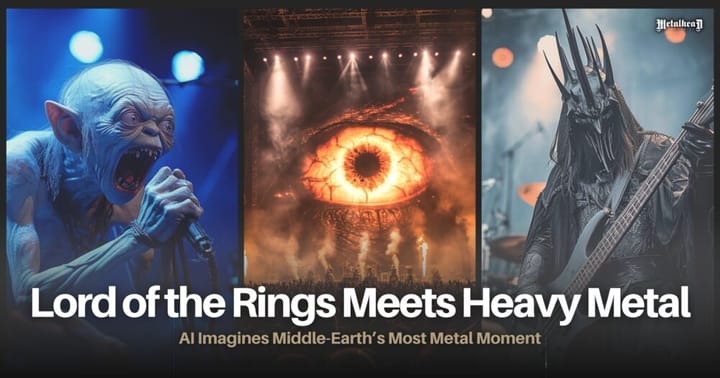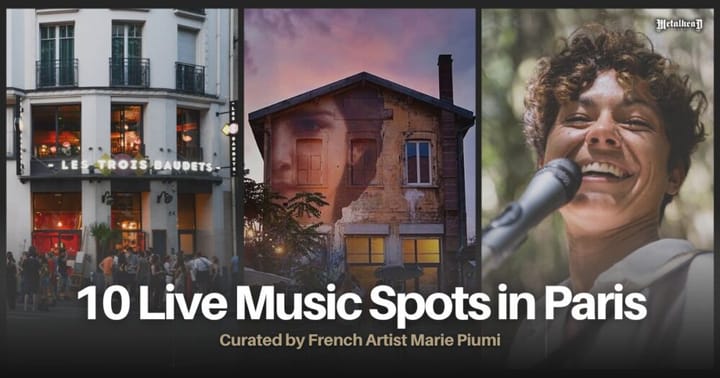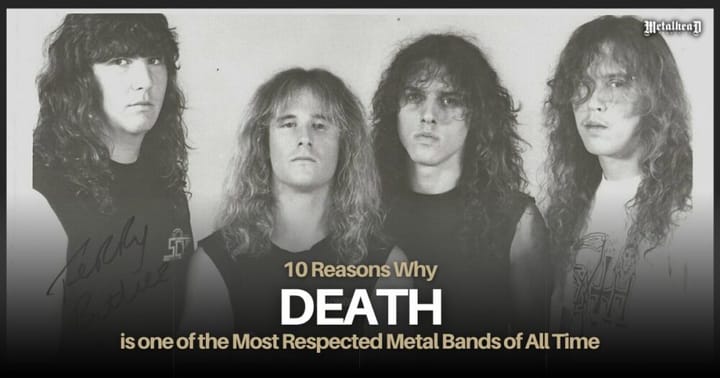Between the Buried and Me is going to take Dream Theater's place in the future, says Adam Driskell of Circles of Namibia
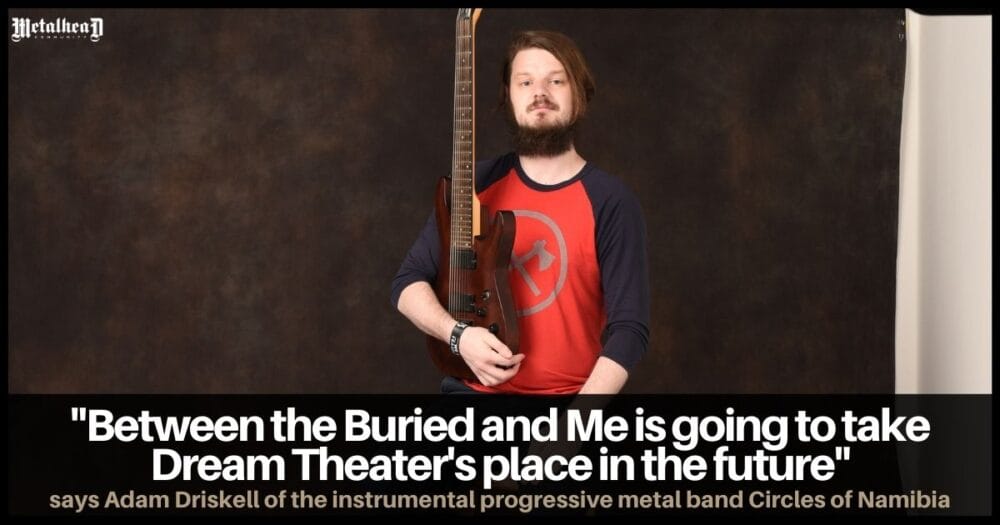
Circles of Namibia is a promising instrumental progressive metal project of Adam Driskell, we featured here on Metalhead Community not long ago with the song review of Mountain, off from their debut long-play album, Where It All Began. We've made an exclusive interview with Adam Driskell regarding his career, new album "Where It All Began", future plans, the progressive metal scene, and the situation of up and coming bands.
Q1 - How would you describe Adam Driskell’s one regular day to us?
A1 - My days are always full. Haha. I normally spend at least 1 to 2 hours a day on Instagram and YouTube responding to messages and comments on my posts and then I go out and engage with the progressive metal side of Instagram. I find new bands and artists that I want to review. There are so many amazing artists that put out great videos as well, so I interact with these posts. By doing so, I hope to connect with other artists and make new contacts for the future. This is usually the first thing I do in my working day.
Then, I spend time writing reviews for bands I find online. After that, I film YouTube content. For YouTube, I try to film and edit at least three reaction videos a day. I also film guitar content for YouTube as well. All of that usually takes about 2 -3, or more, hours of my day.
After YouTube-related work is concluded, I work on Fiverr orders. This just takes as long as it needs to.
Next, I usually work on original music. I am currently writing album two for Circles of Namibia. I try to give myself at least 1 hour a day for this.
Then, I work with my social media manager for both Facebook and Instagram. This usually takes about 30 minutes to 1 hour depending on the content we are putting out.
Finally, it is time to relax! I usually end my day by watching YouTube content of and playing my current favorite game franchise, Pokemon. I love and adore the Pokemon games. I will go outside for about 1 hour a day to exercise and I will play Pokemon Go. Once getting back home, I will watch Poketubers and play more Pokemon games on my computer. Then I go to bed. Rinse and repeat.
Q2 - How was CIRCLES OF NAMIBIA born? Was your plan always making instrumental modern progressive metal from the beginning?
A2 - Oh man, this is a big question. Haha. I started writing progressive metal music when I was 15 or 16 or so and the goal was to always have a singer. I wrote music with the intention of vocals, so I always left open parts for vocals. Eventually, I found out that finding a good vocalist was next to impossible. This might surprise people because my primary project is an instrumental prog metal band, but I am a contra tenor and false chord screaming/growler. I do both well now.
But when I first started writing music, I was a horrible vocalist and switched styles to instrumental music only. Over the next 13 years I would jump around on different failed projects. I was a guitarists and screamer for progressive metalcore project. I did metalcore, deathcore and post-hardcore. I almost finished a post-hardcore album before I stopped with that project.
Then, in 2019, after failing all of projects and pretty much giving up on music entirely throughout the last 2 years of university from 2016-2018, I finally found passion in music again after finding Plini’s music. It was fresh, different and, to be perfectly honest, I had grown out of progressive metal because I felt like nobody was being original anymore. I was finding a lot of joy in metalcore/deathcore at that time. It was because of finding Plini and then finding my joy for prog metal again by going to my initial sources of inspiration that I finally started working on music again slowly in about 2018.
The first song I wrote for the album, Where It All Began, came from me going back to my roots of Dream Theater, Symphony X and Opeth and then combining it with my new love for Plini. It would take me years to finish this album though and I would eventually start finding other bands that helped influence my sound like Periphery, Between the Buried and Me and Rivers of Nihil. This random Hodge Podge of bands would eventually decide my ever-changing sound and then I settled on the band name Circles of Namibia because of the mysterious nature of the phenomenon that is the circles of Namibia grass circles in Namibia.
The grass circles of Namibia were a perfect way of describing my music. My music doesn’t really sound a lot like newer progressive metal acts and there is a lot of mysterious energy in my music and people cannot quite place my influences, even on multiple listen throughs. Because the grass circles of Namibia are a phenomenon that was shrouded in total mystery up until recently, I thought this would be a fitting name for the band. It wound up being a perfect name in hindsight.
Even though I am the primary song writer and audio engineer for this project I hired amazing musicians from Fiverr to ultimately wind up completing the full sound of the project. Once they added their parts, the project was fully completed, and then the project was born with the release of “Where It All Began” in 2021.
Q3 - Is there any chance of seeing a guest vocalist on a song, or an acoustic song in Circles of Namibia's plans?
A3 - This is a very interesting question. Even though, now, I am a capable false chord screamer and vocalist, I never intend for vocals with lyrics to be a part of this project. I do use choirs and other vocal sounds though. I am totally okay with adding human voices for more a choral effect, like with what Plini does on his music. I just didn’t do that kind of thing on this record.
I absolutely intend on having sections of the next record to have both nylon string and steel string acoustic guitars. There will also be a big quartet arrangement on the next album as well. It will have a steel string guitar and as well other, more Asian traditional instruments as well.
Actually, if you listen very closely to the song “One Last Time” from “Where It All Began”, then you can hear a steel string acoustic that is doubling the piano in the beginning/middle parts of the song. Haha. So, I have already used acoustic guitar on the current album, but next time it will be much more pronounced and will have more standalone sections.
Q4 - As a collective, how special Circles of Namibia is, in your opinion? What this band does better, or in a more special way than other bands in the same genre?
A4 - I believe Circles of Namibia is a whole other beast in the instrumental progressive metal community. Even though I have artists that I pull deeply from, the way I put my compositions and arrangements together doesn’t really sound too much like any of my influences. I use the riffing the Dream Theater, the key elements and ambience of Symphony X, the chordal melodies and bass melodies of Opeth, the soundscapes of Plini and the heavy, quirkiness and breakdowns of Between the Buried and Me to help accomplish my sound. I also have soaring strings parts that are not done like this in modern progressive metal too much. The closest I find I can to what I do with the keys is Symphony X, which is been one of my primary influences since I was 15.
Now, this is a point that maybe some could argue, but one of the reasons my project sounds so unique is that I am not a djent band. I don’t rip off other 8-string metal projects. Yes, I use an 8-string guitar and use I use some djent stereotypes, but my riff writing, arrangements, and song compositions are nothing like djent or modern progressive metalcore. But people don’t know how to describe my music and djent is the only word we currently have for heavy 8-string guitar modern metal music, so I get lumped into that category. It would be like saying Leprous is a djent band or Rivers of Nihil is djent band. Neither of them are djent bands. They just happen to use 8-string guitars and have some similar tones to djent sometimes. It is what else they bring to the table that makes them standout. My music is similar like that I would like to think.
My music is its own sound, which most of the progressive metal community, ironically, cannot say that they even have. Most bands are just rip offs of Dream Theater, Periphery or some other super popular prog metal act. I am happy to say that, even though I am influenced by them, my overall sound offers something very different to the modern progressive instrumental metal scene.
Q5 - What can you tell us about the thematic approach in "Where It All Began"? What were the main influences?
A5 - The theme of “Where It All Began” goes back to where it all began for me. It is way the album name is what it is. After jumping around in many other projects and experimenting in many of other genres, including both classical and classical piano, I eventually found out I was thinking much too hard and went back to my roots that got me into progressive metal in the first place. These bands being Dream Theater, Symphony X and Opeth.
These big 3 bands will always be the primary influence of my sound though, regardless of what band I am listening to currently. Other bands like Plini, Between the Buried and Me and Rivers of Nihil do find their own way into my sound though.
The thematic approach to my much is telling stories or exploring ideas/emotions through instrumental music, which is why I don’t want lyrics associated with my music. The title of every song is a hint at what the song or sound of the song is about. But, if people find their own meaning, then great. That is why I love instrumental music. The meaning of instrumental music is subjective by nature. I hope people find their own meaning in the music. That helps the listener connect to instrumental music, which I think is harder to do than for bands that have vocalists. But, if a listener wants to know the meaning, it is obviously there within the title of the song.

Q6 – Where did you record the songs? Who produced it? And how are you feeling about the outcome so far?
A6 - I record all my electric guitar parts on Pro Tools with my professional, at home setup. It is literally just my guitar, a Focusrite interface and all my guitar tones and effects are custom made and produced within Pro Tools using BIAS FX. I don’t use any premade effects for any of my songs. This is another thing that helps set my music apart. Everything, even down to the tones I use, are hand-built within BIAS FX.
I write almost all my music with Guitar Pro. Once I have a song totally fleshed out, and the arrangement is good and the composition is finished, I record all my guitar parts to the MIDI from Guitar Pro. I change some things here and there while recording, but it mostly stays with what I imagined in Guitar Pro.
Then comes the next part which is hiring my bassist, drummer, keyboardist, and any other additional musician that are needed for the song. After all of that is finished, and I received all the music parts from all the musicians I hired, I then proceed to the do the mixing and postproduction process, which I am entirely responsible for.
While I notice the small errors in the production and mixing process, I am happy with how the overall product turned out as a good first attempt, and many other critical listeners have expressed similar thoughts through different album reviews.
Q7 - Your personal favorite song from Where It All Began, and why?
A7 - This is a hard question. Haha. I pondered this question for about 20 minutes or so and finally landed on “One Last Time” being my favorite of the album. It is a deep cut off the record coming in at track number 7.
There are many reasons I love this track so much, but the primary reason that I think this is the best produced song on the album. I feel like everything about the song, from the arrangement, songwriting, playing, recording mix and master were perfect for what the song needed.
“One Last Time” is about leaving something for the last time and how hard this can be. But to every hard part of leaving something behind or even losing a loved one, there is a silver-lining, a brightness, if you will, to it. It is hard to manage the pain of leaving or saying goodbye for the last time. That feeling is what the whole first half of the song deals with.
Then, towards middle to the end of the song, there is a change to triumph and then beautiful triumph. Because you didn’t just make it to the end of your trial. You got though it with yourself intact and with the, hopefully, positive memories of what you left behind. That is what the staccato strings parts that goes into the clean guitar breakdown and then into the solo section represent. I think I did a great job of musically describing these feelings. Also, the feel of the breakdown that leads into the eventual solo is one of my favorite parts on the whole album. The following solo, although not technical or long, wound up being a perfect way to end the song.
I want people to recognize me as a song writer and producer, not only just a guitarist. I understand musical restraint. In fact, all the greats of progressive metal know and understand this. That is what I aspire to, great song writing, composition, and production. “One Last Time” does all these things well and makes it my favorite.
Q8 - What can you tell us about the Short and Long Term Objectives of Circles of Namibia? What is the next checkpoint?
A8 - The short-term goals for Circles of Namibia are to continue building my social media presence on YouTube, Instagram and Facebook while continuing to write my second album. As I am a project that doesn’t intend on touring anytime soon, growing myself online is a necessity.
My long terms are like the short-term ones. Those being continued growth online and then shooting for a 2022 or 2023 release for album 2. Album 2 is stupidly ambitious and will require a ton of extra musicians that were not needed for “Where It All Began”. I am also going to add a good amount of traditional Asian instruments to it. I don’t want to give too much away, but I am stoked with how it is coming together so far.
Q9 - What can you tell us about the metal scene of your native town? About the general mindset and approaches?
A9 - Though I live in Seoul, South Korea now, I grew up in Nashville, Tennessee. The metal scene in Music City was not bad back in 2011-2012 when I was most active in. There was a dry spell and then we recently had an amazing resurgence. One of the more notable prog metal bands in the area, Flummox, got Max Mobarry of Others By No One on their roster. Max is very prominent with his own music and gotten a lot of recognition from the bigger progressive metal scene. This news was huge to me, and to the scene in general, and I think that him being a part of Flummox is putting Nashville metal back on the map a little bit more. Another amazing band from the area is Lines in the Sky. Lines in the Sky is a sick progressive metal trio. They did a whole Rush cover set that blew my mind apart a short while before I moved to Korea. They are every bit as talented as Rush and I don’t say that lightly.
Between Flummox and Lines in the Sky, I can see the scene really starting to flourish again and I really hope it does! Music city has a lot of other great underground metal bands waiting to be discovered. Nashville is called “Music City” for a reason. There are many great talents, both in and out of country music, that are in the area.
Q10 - Which bands are leading the modern progressive metal scene at the moment, and how special they are in your opinion?
A10 - Between the Buried and Me continues to be a leader in the more modern side of things. They are the gap between their generation, my generation, and Dream Theater’s generation. I think they are quickly going to overtake Dream Theater’s place in the genre within the next 10 to 20 years. Their Colors ll album is amazing and is, somehow, every bit as good as Colors l. Colors l was the album that got me into screaming and heavier, more technical genres of music. It really opened my eyes to what is possible for heavier progressive metal acts. They continue to innovate and reimagine themselves each album. They have been in their prime since Colors l and just haven’t stopped.
I can’t not mention Periphery here. Periphery has continued to be a driving force in the progressive metalcore world since 2010. They also continue to innovate and change their sound for the positive as the years go on. I think they are some of the bests in the progressive metal genre for Misha’s and Nolly’s ability to produce and record amazing albums. One of the reasons they are so prevalent in the genre is because of their near-perfect productions on every one of their records. I am also stoked for P5. I have been following all their updates about the record and I am getting more and more excited for it.
Another band that is making their stamp on the progressive metal scene is Leprous. I have never seen the band get so much recognition as I saw from their most recent record, “Aphelion”. They are unique, creative, and have amazing productions on each of their records. They are setting the bar for modern progressive metal for use of dynamics in their songs for building up and breaking songs down. I haven’t heard another modern prog metal band that does dynamics the way they do. Also, their vocalist, Einar Solberg, is setting a new standard for prog metal vocalists. His perfection as a singer and screamer are almost unmatched. He has so much vocal control. From his soft and non-imposing falsetto voice to his full range mix voice, he just adds power and vocal dynamics I don’t hear other bands do.
Rivers of Nihil emerged from the technical death metal scene, their latest two records have leaned heavily into progressive metal. They are changing the way progressive death metal bands are looked at in the genre. I seriously think they are on their way to filling up the void that Opeth left in the prog metal world when Opeth’s musical direction switched more to progressive rock. Rivers Of Nihil is innovating the death metal side of progressive metal for sure and, if they continue this path, then they are going to continue blowing up the way they currently are.
I think the leader of the modern instrumental progressive metal scene is Plini. The man is a musical machine. He completely changed my outlook on progressive instrumental music. I used to think bands needed a vocalist to make them stand out as the vocalist is normally the part of a band that is most noticeable and recognizable. Plini took his talents has a guitarist, producer and composer and took my expectations of progressive instrumental metal music and turned it on its head. He controls emotion using dynamics and amazing soundscapes brought from his guitar and synth pads that are other worldly. His music makes me float on air the same way that YES’ music does. He can convey the same emotions as YES without the use of vocals, like the way classical composers control emotions through music. He is a force to be reckoned with and will continue to be one of the primary driving forces in modern progressive instrumental metal music.
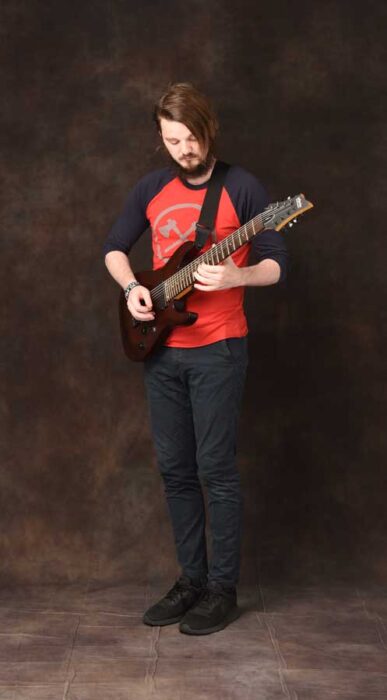
Q11 - Do you believe up-and-coming bands have a better chance in the 21st century than before?
A11 - The answer to this question, is, without a doubt, yes. 100% so. If bands utilize sites like YouTube, Facebook and Instagram correctly, then they should be able to make enough sales to keep themselves alive. Bands don’t need a record label in the same way as in the past. It is why I remain independent. I would say it is harder to be independent because so much of the responsibility of the marketing side of things either falls my shoulders or I must hire people to help me. But, if you are willing to put the extra work and money into marketing your music by yourself, then you will own your music outright, which is something that you just cannot control if you are on a record deal.
Q12 - What makes a band "Great," in your opinion?
A12 - A “great” progressive metal band, in my opinion, is one that can innovate, but can also be listenable in some way. This is the same idea as what I shoot for in my own music. The bands I mentioned in question 11 all do an amazing job of this. They all have their own unique sound, but they are melodic, sometimes even catchiness to their music.
I think bands that can control their sound using dynamics or cool production decisions are also “great.”
The final thing I look for in great progressive metal bands is musical restraint. It is why I love all the previously mentioned bands. All these bands can shred, can blast beat, can tap, can sweep, and do amazing things with their vocalists if they have one. But something that every band I mentioned has in common is that they understand when heaviness is required or not. They understand when a solo needs to shred your face off or when they need to dial it back for only melody and emotion. Musical restraint is the sign of a musically intelligent musician and is something I strive for as well.
Q13 - Top 5 artists/bands influenced Circles of Namibia?
A13 - Dream Theater, Symphony X, Rivers of Nihil, Plini, and Between the Buried and Me.
Q14 - Top 5 albums influenced "Where It All Began" album?
A14 -
The Parallax ll: The Future Sequence by Between the Buried and Me
Octavarium by Dream Theater
Where Owls Know My Name by Rivers of Nihil
Handmade Cities EP by Plini
The Odyssey by Symphony X
Q15 - Lastly, what would you like to say to our readers?
A15 - Lastly, I want to give a massive shoutout to the amazing musicians that helped make my music possible from Fiverr. Much like Steve Wilson of Porcupine Tree requiring the help of the amazing talent of Gavin Harrison to bring Porcupine Tree’s vision to reality, without the work of the extremely talented of my keyboardist, bassist and drummer, Circles of Namibia would not have been brought to life. I want to share all their pages here. If any of you need these extremely talented musicians to help you bring your project to life, then please check out these links.
I also want to give a big shout out to Metalhead Community’ CEO Burak, who has been my social media manager and has helped me immensely with my social media marketing on both Instagram and Facebook. Without his help, none of the good things that have happened with Circles of Namibia would had happened as they have so far.
To the reader, thank you so much for your interest in my music and for reading everything. You are the reason I can do what I do. I look forward to making more music and getting the Circles of Namibia brand as far out there in the world as I can.
Links to bassist, keyboardist, and drummer I used from Fiverr:
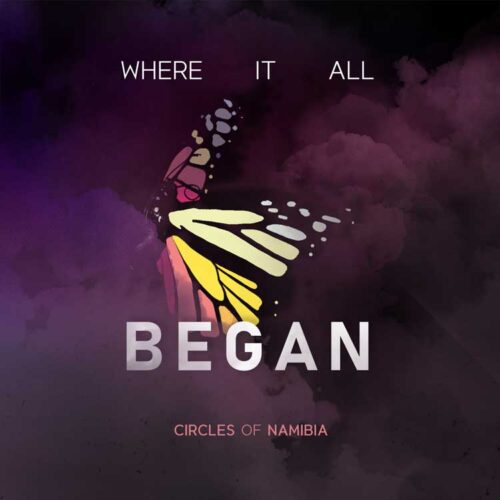
CIRCLES OF NAMIBIA on the WEB
Facebook
Instagram
Youtube
Spotify
Immerse yourself in the sounds of the unseen metal scene. 'Monsters of Metal Underground' is your curated compass to what lies beneath.
